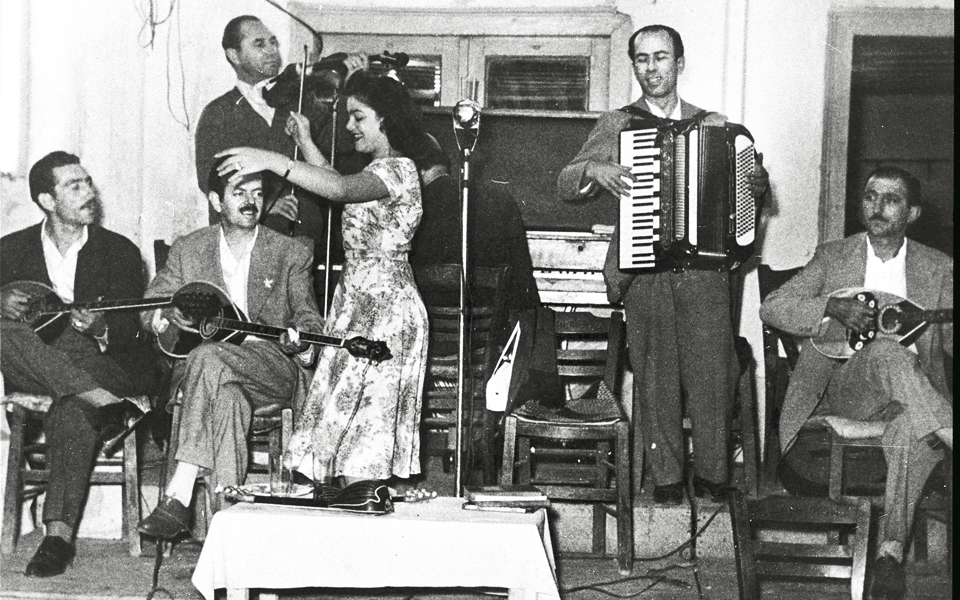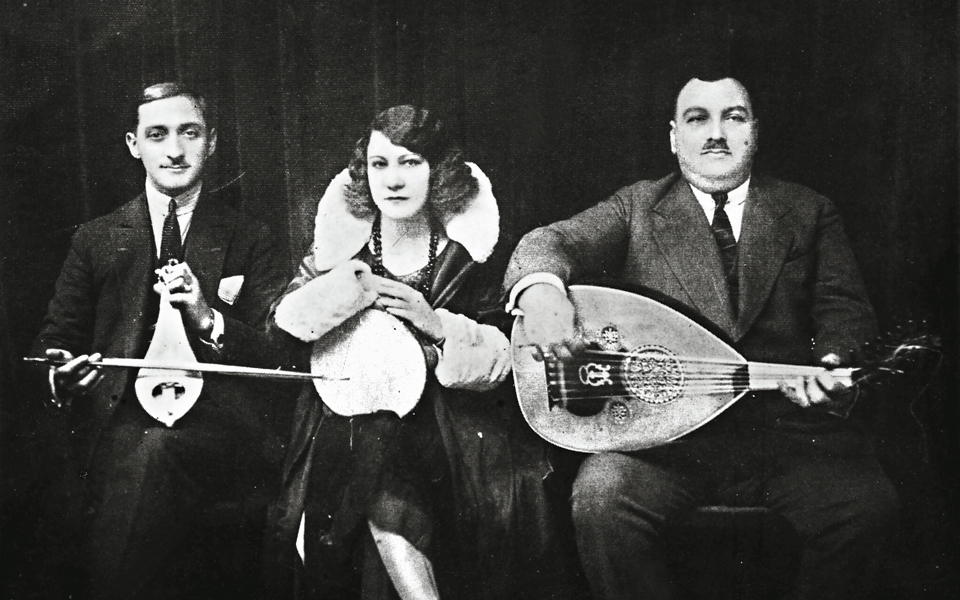A City in a Bite: Thessaloniki-Style Street Food
From postmodern bougatsa to wood-fired pizza...

Vassilis Tsitsanis abandoned a career in law to pursue his love of music and is considered one of the rebetika style's greatest songwriters.
Thessaloniki’s association with music has, over the centuries, been linked to the influx and departure of people and communities, cultural fusion and the impressive blend of astonishingly talented individuals who lived in the city or passed through it. The songs of the Sephardic Jews, a community expelled from Spain in 1492, found a new home in Thessaloniki. These sounds co-existed with amanedes, visceral songs expressing deep sorrow and associated with the Turkish community, an integral part of the city until 1912, as well as Slavic rhythms from the wider Balkan region to the north.
The influx of ethnic Greek refugees to various parts of the country, including Thessaloniki, from Asia Minor in 1922, following a failed Greek military campaign against the Ottoman Empire, served as a key spark that ignited rebetika, the period’s most distinctive form of urban song, that had begun to develop in Greek port cities in the late 19th century. Though highly inspired and authentic, rebetika songs were initially marginalized as a raw form of music that expressed hardship and displacement felt by outsiders, often with references to hashish smoking at dens. This musical style began to acquire greater social acceptance in the early 1940s by presenting themes that were more suitable for the masses. One of the period’s legendary rebetika vocalists, Roza Eskenazi, an artist of Jewish background from Istanbul who ended up in Thessaloniki in the early 20th century, captured the hearts of locals with her heartfelt and elaborate vocal delivery.

Vassilis Tsitsanis took the passionate form of rebetika and adapted it to a more mainstream audience.
The city’s considerable rebetika tradition was maintained throughout the Nazi occupation by the great Vassilis Tsitsanis, the style’s most prolific songwriter who penned countless classics. This Trikala-born pioneer, who had planned to study law but was won over by music instead, played a pivotal role in steering rebetika into the mainstream, around the time the style began developing into a milder form of song to become the popular (laiko) music genre. For quite some time, Tsitsanis also ran his own music venue in Thessaloniki, the famous Ouzeri O Tsitsanis, at the corner of Pavlou Mela and Tsimiski streets. The artist penned there some of his finest material, which ended up being recorded once World War II had ended. The fascinating story of the venue is now told in a recently released feature film.
Thessaloniki has always mined its traditions and roots while also absorbing modern European ways. Pop-rock groups such as the Olympians, formed in the mid-1960s, created music reflecting the new sounds coming from the West. The city also spearheaded the country’s contemporary rock scene with Trypes and Xylina Spathia, two Greek-language acts whose fresh sounds and lyrics provided a base for the entire local rock scene in the 1980s and 90s. The frontmen of both these acts, Yannis Agelakas and Pavlos Pavlidis, respectively, remain creative musical forces as solo artists to this very day. The university city’s considerable population of young adults has always served as fertile ground for musical creativity.

Rebetika is all about conveying emotion, and Roza Eskenazi's dramatic vocals and heartfelt delivery won her many fans in her heyday.
The late Nikos Papazoglou, who joined the scene as a pure, fresh-sounding and slightly unconventional singer and songwriter, with innovative skills as a studio engineer, was instrumental in reviving a wider interest in more authentic musical roots. His work helped rid any sense of shame or awkwardness felt by locals for older musical ways at a time when Greek music was generally being westernized, often badly. Papazoglou built and launched his own Agrotikon recording studio in Thessaloniki’s Toumba district in the 1970s and many of the city’s other musical greats went on to record here. They have included Dionysis Savvopoulos, a pioneering singer-songwriter who emerged in the mid-60s as an artist who dared to experiment with politically charged lyrics at a time of major sociopolitical upheaval in Greece. He remained a key musical spokesman right through the post-dictatorship era after 1974.
In addition, the exceptionally popular singer-songwriter Sokratis Malamas, nowadays regarded as the ambassador of quality Greek music – often tagged entehno – who experienced a gradual rise to fame, including as a guitarist in Papazoglou’s band, also recorded a string of early landmark albums at Agrotikon. Serving as yet another fine example of the impact of Thessaloniki’s melting pot on artists, Malamas’ Greek sound has been creatively influenced by western ways, drawing a wide range of fans, in terms of musical preferences and age groups. Around the same time, the other side of the city’s fervent musical spectrum was represented by the independent label Ano Kato Records, headed by Giorgos Tsakalidis, which unveiled the country’s most significant rock acts.

Nikos Papazoglou played a significant role in halting the decline of rebetika in the face of attempts to modernize Greek music.
Adding to the city’s fascinating musical tapestry, the prolific and top-selling output recorded at the Vasipap studio run by Vassilis Papadopoulos, an attraction over the years for the city’s full-on Greek acts making music for the masses, further highlights its musical fertility. The range of acts that have recorded here include local laika (popular) stars Marianthi Kefala and Vassilis Karas, one of the country’s more widely listened to singers, whose work is based on old rebetika-era amanedes and the city’s Ottoman traditions, all adapted for modern local tastes.
Thessaloniki also features countless rehearsal studios in and around the city, as well as many hallowed music venues. They have included Minoui, where legendary rebetika singer Lilly was a regular feature, to Mylos, Ydrogio, Pararlama, as well as bouzouki- heavy clubs like Souita, Liogerma and Akroama, all of which have contributed to the city’s musical history.
Without a doubt, Thessaloniki has consistently produced an exceptionally large number of talented acts but never managed to hold on to them. Over the years, virtually all have taken an inevitable step into the bigger picture ending up in Athens, where record company headquarters, bigger clubs and the country’s mainstream media, each possessing the potential to project and further establish acts, have all been based. Subsequently, Thessaloniki has continuously bid farewell to its artists.
As for the city’s recent recording activity amid a music industry largely devastated by the digital era, studios run by Giorgos Pentzikis and Giorgos Kazantzis have managed to keep things afloat. Acts such as Giorgos Christianakis, a superb composer of soundtracks, pop music artist Monsieur Minimal, and Manos Mylonakis, one of Thessaloniki’s most innovative newer songwriters, have insisted on living and creating in the city. Their work enjoys nationwide appeal.
* Giorgos Toulas is editor-in-chief of Parallaxi, Thessaloniki’s historic free press magazine.
Three landmark releases:
I EKDIKISI TIS GYFTIAS (REVENGE OF GYPSYDOM) This album, an impressive hybrid of sophisticated and simpler lyrics, set to pure-hearted Greek sounds, had great impact not long after its release in 1978. Besides acquainting listeners with the emerging Nikos Papazoglou, it also inspired other artists to expand their creative horizons.
ANO KATO RECORDS – 20 YEARS A compilation of Greek rock music selections by acts from Thessaloniki, the style’s domestic birthplace, originally released on Ano Kato Records. Issued in 2004 to mark the label’s 20th anniversary, this compilation includes tracks by Trypes and Xylina Spathia, both pivotal in the Greek rock music circuit.
VASSILIS TSITSANIS SYNNEFIASMENI KYRIAKI (CLOUDY SUNDAY) Originally released in 1965 and featuring Greek classics sung by a host of legendary Greek singers – including Stelios Kazantzidis, Grigoris Bithikotsis, Stratos Dionysiou, Poly Panou, Yiota Lydia, Marinella, Keti Grey, as well as Tsitsanis himself – who all gathered to mark the significance of this exceptionally prolific and gifted songwriter, this album showcases gems of a highly creative musical era. It serves as an ideal introduction into the world of Tsitsanis and oldschool Greek music in general.
From postmodern bougatsa to wood-fired pizza...
From fishermen’s chants to moonlit serenades,...
A living portrait of Olympou Street,...
This short walk takes in eleven...